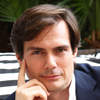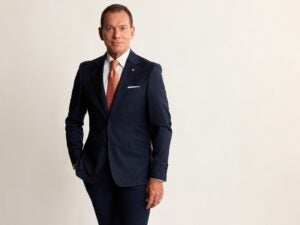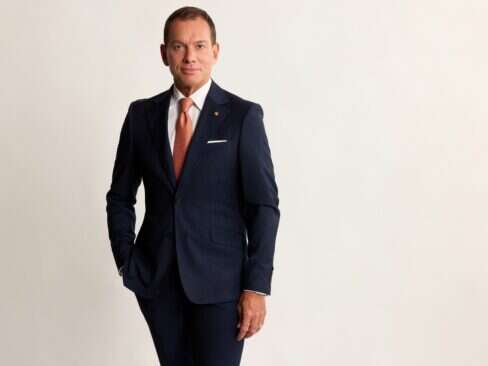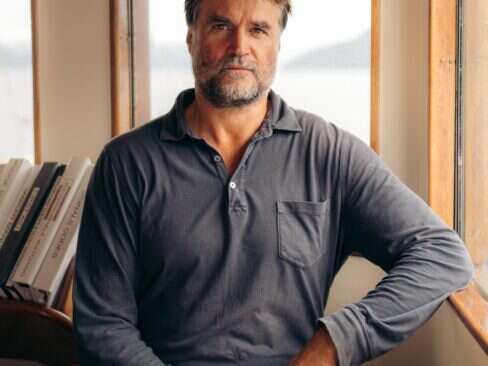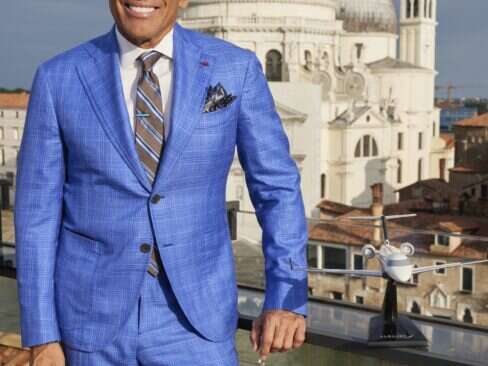
ChairmanV Resorts Limited
Baron Jean van Gysel de Meise leapt from finance to hospitality with success and then moved into boutique hotels. He renovated a Spanish property in the tiny Andalusian village of Vejer de la Frontera where he mixed modern elements with traditional architecture creating a much-talked about retreat. Recently he took time out of his global travels to meet with Elite Traveler President and Editor-in-Chief, Douglas Gollan, at New York’s Core Club. The discussion ranged from his new venture in Dubai, on The World islands, to his love of all things horses.
ET: Tell us a little bit about your background before you got into the hospitality and the real estate development business.
Baron Jean van Gysel de Meise: I was born in Paris, France. I went to high school in Paris and then I left to come to the States to study. I went to Columbia Business School here and before that a small school called Fairfield University in Connecticut, which was great fun—a Jesuit school.
From there I started my career in finance, in investment banking, working for a small group within the Rothschild Bank in the early 90s, restructuring quite large companies. Rothschild was the most famous restructuring group at the time. Before I started my career in investment banking I did mergers and acquisitions for 10 years, and managed hedge funds for ING in New York for the treasury office of the group.
Then in 2000 I left finance to get into real estate. My passion really is interior design and architecture and the hotel business. I’ve always loved anything to do with small boutique hotels. It’s always been a passion of mine to discover new small hotels.
So I got into the real estate business leaving finance behind. The situation was starting to boom for the real estate market because of low interest rates. I went into the residential market doing high-end residences and flipping them, and that was very successful. When I accumulated enough money I invested in a larger hotel in Belgium, which is called the Plaza Hotel and has 192 rooms.
It’s a very traditional hotel. It’s the same architect who did the Hotel Georges V in Paris, which is now a Four Seasons. Both hotels were built in the 1930s. So it’s a very successful business. However, it was a little boring for me because it’s not really where my passion lies. I like smaller and more modern places.
So I decided to launch a brand, my own brand called V, and after the V you have three dots. I chose V… because the first hotel is in a village called Vejer de la Frontera, which is a small village in the south of Spain. It’s one of the last villages before the Straits of Gibraltar where you can actually see the mountains of Morocco on the other side.
So this was the first of V…, with the three dots after the V—just to make the name and the brand more interesting. So V… was really the beginning of a new brand. Having accumulated quite a lot of experience in hotel management from the financial side and the daily management, I was pretty well-equipped to start a brand. But having a multitude of really small boutique hotels is not really the way to go even though it’s a great passion. I needed to develop a concept that was still boutique yet big enough to make financial sense and something I could develop over time. So the trick was to find a location and the best location was Dubai.
ET: You were talking about building very special hotels, unique hotels. Every time you turn around it seems like Dubai is building a new island. It seems like maybe a little bit of a different place for such a targeted type of development.
Baron Jean van Gysel de Meise: I believe in destiny but you have to provoke destiny also. I went to Dubai a year and a half ago in early 2007 for the first time as a tourist and for the races, the big thoroughbred horse race that I really love called the Dubai World Cup. It’s the biggest purse in the world. I went there to see the race and wanted to stay in a boutique hotel but there weren’t any. The Amanresorts, the Banyan Trees were not there yet. Banyan Tree is making a move now but Amanresorts is not yet.
So that really intrigued me and I started to do a market study, and the timing was perfect because it was exactly where I was looking and the time at which I was looking to launch my brand. So after the market study I realized that people, from a hospitality standpoint, were seeing Dubai or the kind of investments that were going into Dubai as very large hotels—monster buildings with two, three, four or 500 rooms. And I was convinced that in the luxury segment there were people like me who were looking for a more intimate place with more attention to detail.
There are many different standards in luxury and I think a lot of large hotels lose their exclusivity and luxury standards by being too big. Once I identified that there was an opportunity and identified why competitors such as the two groups I mentioned previously did not go in, I decided to make a quick and rapid move into Dubai.
Dubai is a very modern city. It’s the New York of the 21st century, yet the water and its location and the beaches also allow it to become a very interesting tourist resort. So what I’m trying to create is a haven of peace that’s very accessible from the city yet gives the impression that you are elsewhere. A lot of hotels, like the Amanresorts, create beautiful hotels but within beautiful environments. It’s kind of easy because the setting is so incredible that you really have to have no talent at all to mess up a resort in such a beautiful environment.
Dubai is a city and creating a beautiful environment within a stressful urban surrounding is a challenge. But the contrast becomes much more interesting, and I think that’s a challenge and a direction I want to take the company—building these elegant, small boutique hotels within environments that are not always easy for these types of products.
ET: And your development in Dubai is on The World?
Baron Jean van Gysel de Meise: Exactly. Dubai is on the coast but there’s not a lot [of coastline] because Dubai is small. Most of the beaches are owned by the locals. In addition to the The Palms, they decided to do this project called The World, which is a group of 300 islands five minutes off the coast of Dubai—the only access is by boat. To make it interesting they decided to shape the group of islands to resemble the world map. So you have continents, you have countries. The islands themselves don’t really have the shape of the countries, it’s their location that represents the countries on this global map.
So I bought the island of Greece. And why Greece? Well I’m a romantic at heart so Greece is a name that a lot of people can relate to because of its history and the romantic aspects throughout history that the people associate with the islands. It’s also very well-located. It’s in the middle of the 300 islands. I have a nice body of water in front of me, and the size of the island really matched the size of my project so it was a good fit.
It was easy to choose The World because when you launch a brand the first location is so important. There is such a huge media following on The World; it’s such an unbelievably challenging project that I could piggyback behind all that media coverage. It’s actually working very well.
ET: Tell us where the project is right now. Have you broken ground? When is it opening?
Baron Jean van Gysel de Meise: The World has sold all 300 islands. The marketing was to sell the islands by invitation only. I don’t know if they did that for all 300. I certainly was not invited but I bought an island. Some people must have been invited. But it was a way for them to make it exclusive and it did work. So they’re fully sold out right now, which is a good thing because when I bought my island a year and half ago, they were probably 50 percent sold. So the project is working very well.
Right now I’m in a position to be the first one to build on The World. Things are right on track. I put together a team of young people. I like to work with young people and give them a chance. It’s worked out very well for me.
The architects involved in the project are three Italians, very talented people. It’s a young woman and two young men, and they’ve done established projects. The combination of their talent, youth, motivation and working 18 hours a day has allowed me to be in a position to really start to market my project very early and to start building the project very early.
ET: And when are you planning to open it?
Baron Jean van Gysel de Meise: It’s a two year construction process. Being the first one is a double-edged sword because in being the first there are a lot of technical challenges that we are aware of but at the last minute I’m sure that we will have some unexpected challenges. So the planning so far is for a two year construction. In Dubai they work 24-hour shifts, it’s two to three shifts a day. So we should be open by March 2011. If we miss that deadline it will be fully opened in September 2011.
ET: And there’s a real estate component as well?
Baron Jean van Gysel de Meise: Basically, the traditional hotel concept is more and more difficult to be financially successful, it’s not financially reliable anymore. So a lot of the operators or investment companies are starting to move away from the traditional hotel and build and sell rooms because building is extremely expensive, costs for employees are extremely expensive and the margins are getting reduced more and more.
A lot of companies including myself are now offering residential components and mixing these residential components with a hotel service. You really don’t make any more money on the hotel services, it’s just that service that you bring to the residences that you sell.
It’s 52 units and 200,000 square feet of construction so it’s very manageable. The units are very large but the overall project is boutique and small. You have 11 villas; they’re called Calliope Villas. I had to find something reminiscent of Greece because the lines are very modern, open and clean. So it is the Greece of the 21st century and not ancient Greece.
The Calliope Villas stand on stilts. They’re two-bedroom villas with a flat deck on top of them with a pool and a maid’s room. So it’s two plus a maid’s room and they’re very much in the style of what you have in Bora Bora—those villas on stilts—but it’s modern architecture and nothing to do with thatched roofs. So we have 11 of those. I have seven Ocean Villas that are lofts. They have three bedrooms plus a maid’s room. The ceilings are 12 feet high and they have their own berth for a yacht of up to 75 feet. These units are all over water with infinity pools that spill over into the gulf waters.
They are priced at $8 million. They’re about 5,000 square feet. The villas that I talked about previously that are on stilts, the Calliope, are $5.5 million and they’re about 3,000 feet.
Then I have 34 apartments, which I call suites that are one and two bedrooms. The one-bedrooms are 1,500 square feet and the two-bedrooms are over 2,000 so they’re quite large. Those range from three to $4.5 million. There is a marina for 34 boats, a spa, two restaurants, a pool, lounge bar and that’s about it.
ET: What are the things that you think will set that apart from all of the competition out there? Are there some distinctive features?
Baron Jean van Gysel de Meise: You know, there’s a lot of competition. Luxury in the hospitality world is everywhere. I think it’s difficult to make everyone happy for sure. I can only go on what I like personally when I go to a place. I like unusual architecture. So to me I need to be really transported and moved by the architecture, by its lines. I’m a big fan of Richard Meier. The team of architects whom I’ve hired design very much along those lines even though they have their own style.
So to answer your question directly, it’s a combination of surprise through the choice of your location and that comes back to the contrast that I want to offer between stressful environments and a place where you can find yourself again. So location, architecture and then service. There’s a lot of companies that offer fabulous service all over the world. How do you distinguish yourself from them? You probably don’t because service, after a certain degree, there’s only so many things you can do.
So I think the success of a good hotel is when that hotel makes you feel at home. You go to that hotel and you start unwinding and you feel relaxed for many, many different reasons. I think attention to detail through a very disciplined service is essential. But again, if you don’t have that then you can’t even talk about developing a luxury brand.
ET: Talk to me about Dubai. Is this is your first project in the gulf?
Baron Jean van Gysel de Meise: It’s my first project in the Middle East and I chose the region because of its tremendous growth in the last few years. Dubai is very politically stable. All the countries around Dubai, including Dubai, are growing at seven to eight percent annually.
There’s a huge influx of tourism, every year tourism is growing 25 percent a year. People from all over the world are going to these areas because of the growth and the business opportunities. I wouldn’t be surprised if you had 20 percent of Wall Street working for some of the financial companies in Dubai right now.
So yes, it’s my first project in Dubai. It was chosen because I think it’s one of the areas in the world that offer the most stability, the most growth, but it’s managed very cheerfully. And there are no taxes.
ET: Let’s assume that I wanted to go to Dubai because I read about all the growth in this stable area. What are some of the things that somebody who’s not done business in Dubai should think about or know about before they go over there and start whatever type of business they want?
Baron Jean van Gysel de Meise: You need a good local attorney because the laws and regulations change rapidly. They’re trying to improve them and get to the standards that you have in the States or in Europe, which wasn’t the case five years ago. So laws are changing fast, which is great because it prevents a lot of shady business from going on. So you need a good attorney, a local attorney. There are several very reputable firms. I think that’s the key when you start over there.
And if you have that, afterwards you can properly capitalize because it’s expensive to do business. The opportunities are great but it’s not cheap. So between capital, a good attorney and a very proactive team I think you’re fine because they’re very open, they’re very efficient and they want to do business.
ET: Do you need to have a local partner on the ground or does that just vary with the industry?
Baron Jean van Gysel de Meise: It varies by industry and by location. For example, on The World it’s a free zone area so foreigners do not need a local partner. I own my company 100 percent. I don’t need any local partner. In some other areas you absolutely need a local partner whether you are in real estate or in financial services or other service industries.
ET: So switching from business for a moment, tell us about any hobbies or things you like to do when you’re not working.
Baron Jean van Gysel de Meise: I love horses. Horses are my passion. I have horses in Argentina. I play polo and I love jumping. I used to do a lot of show jumping when I was younger. I have jumping horses in Argentina, and I play polo in Argentina and a little bit in Dubai. So I read every horse magazine on the planet and I was glued to the TV during the Olympics for the equestrian events. I have a special TV channel called Equidia that showed all the equestrian events during the Olympics. So I’m a horse addict.
My other passions are architecture and interior design. I have a house in the south of Spain that is close to the beach where there’s a Roman village that they discovered. Every time I go to villages that have a strong history and buildings that are still there and can be rescued, I’m tempted to remodel some of them. So I read a lot of architecture magazines, and when I travel I always try to go to places that I respond to from history.
ET: Do you have any favorite hotels outside of yours?
Baron Jean van Gysel de Meise: There’s a brand that I think is fabulous, which is the Park Hyatt. I really love what they do. I’ve stayed at the Park Hyatt in Dubai. I know their hotel in Buenos Aires, Argentina too. I think it’s a fantastic brand. So in terms of the large luxury hotels, it’s one of my favorite brands. On the smaller side I do think that Amanresorts has done a fabulous job.
ET: Thinking about your V… brand—in the next five to ten years, where do you see your company going?
Baron Jean van Gysel de Meise: I’d like to focus in the Middle East. Right now I have this resort in Dubai. What I would like to do is develop five boutique resorts and five urban boutique hotels in the Middle East. The little hotel in Vejer de la Frontera in Spain is more of a chic retreat, more like a home or hotel/home. So in addition, I would like to develop another offshoot called Casa V…, chic retreats that would not be that far from each other. So it’s a different concept. It’s a much more boutique concept, even more refined than the boutique resort or urban boutique hotel.
ET: We’re sitting here in New York and I think the news flash just before we got together was Paulson saying it’s going to cost a couple of hundred billion dollars to hopefully bail out the U.S. economy. You’re selling very high-end real estate. With everything that’s happening here in the United States, do you see you it impacting what’s going on there in any way?
Baron Jean van Gysel de Meise: Well that’s not an easy question to answer. If I had to give you a straight answer I think no. I think that Dubai, Qatar, Abu Dhabi, Saudi Arabia, essentially they’re not affected by the current crisis. They’re not societies that use a lot of leverage. They’re actually right now in a position to buy and rescue some of the firms that we are talking about. I think yesterday in The Wall Street Journal I read that one of the financial institutions was talking to the sovereign funds of Qatar.
So they’re not as affected, and I think they can weather the storms pretty well. I think they’re going to take advantage of that to actually come into the west and start buying undervalued assets. I think it’s the reverse. I see the Middle East as a strong growth area for the next 10 years even if the price of oil goes down. You know, Dubai doesn’t have any more oil, which is why they created this whole platform—a tourist platform and trade platform and platform for commerce.
It’s the hub of the area. It’s a perfect location—three hours from Mumbai, five and a half hours from Moscow, six hours from Paris, seven hours from South Africa. I mean it’s such a perfect location. They’ve been able to significantly reduce their dependence on oil so I think it’s pretty stable.
ET: You’ve had two successful careers so far—finance and now real estate and hotels. If you have a third career what would that be?
Baron Jean van Gysel de Meise: It would be nonprofits. I think actually that I will be able to associate my business career in the future with a nonprofit organization. I think that the human race is living in very dangerous times as far as the future of our planet goes. I think it’s not very original to talk about global warming but when you see that water is becoming scarce all over the planet, that pollution is increasing, that the ocean and the food in the ocean is decreasing, forests are being cut down, oxygen is being reduced; the future is not very bright. If I could dedicate a significant percent of my earnings to increasing awareness around the world I think that would be my third career.
ET: When a successful private company like yours begins the path of rapid growth do you start thinking about listings or selling to a conglomerate?
Baron Jean van Gysel de Meise: It’s difficult to say because I’m not a big fan of maximizing profits short-term. I’m a long-term thinker. There’s a lot of speculation around the world and in a lot of different businesses, and people have a very short-term view in general. I think that going public would not be one of my favorite options.
In terms of bringing more capital into the company to grow faster, that is something that I would consider based on the opportunity and the speed of the growth of the company. I don’t know yet if it can be organically done or if I need outside financing. At this point I’m doing quite fine with what I have but who knows?





